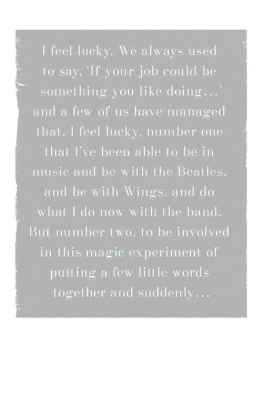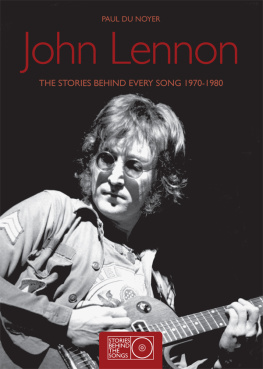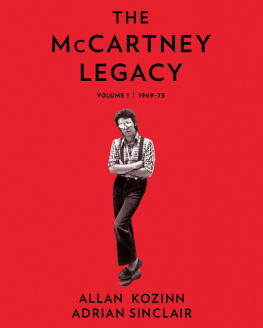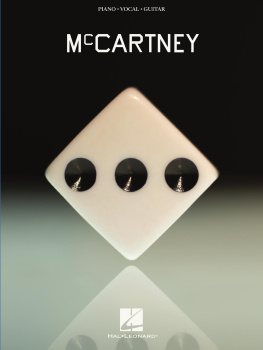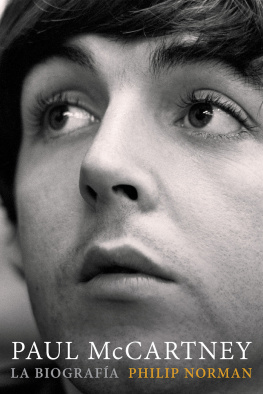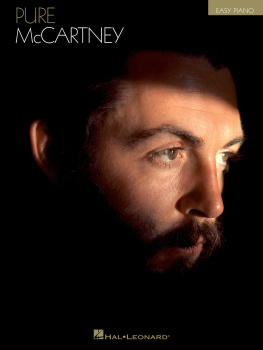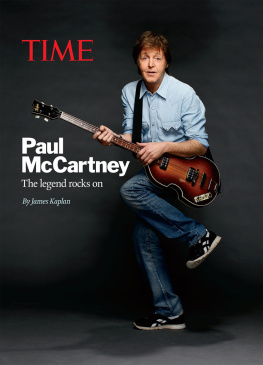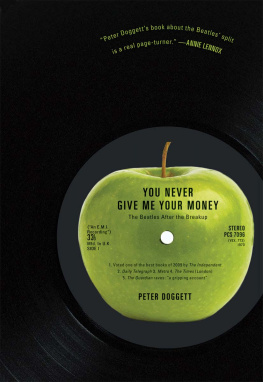Paul Du Noyer - Conversations with McCartney
Here you can read online Paul Du Noyer - Conversations with McCartney full text of the book (entire story) in english for free. Download pdf and epub, get meaning, cover and reviews about this ebook. year: 2016, publisher: Abrams, genre: Detective and thriller. Description of the work, (preface) as well as reviews are available. Best literature library LitArk.com created for fans of good reading and offers a wide selection of genres:
Romance novel
Science fiction
Adventure
Detective
Science
History
Home and family
Prose
Art
Politics
Computer
Non-fiction
Religion
Business
Children
Humor
Choose a favorite category and find really read worthwhile books. Enjoy immersion in the world of imagination, feel the emotions of the characters or learn something new for yourself, make an fascinating discovery.
- Book:Conversations with McCartney
- Author:
- Publisher:Abrams
- Genre:
- Year:2016
- Rating:4 / 5
- Favourites:Add to favourites
- Your mark:
- 80
- 1
- 2
- 3
- 4
- 5
Conversations with McCartney: summary, description and annotation
We offer to read an annotation, description, summary or preface (depends on what the author of the book "Conversations with McCartney" wrote himself). If you haven't found the necessary information about the book — write in the comments, we will try to find it.
Conversations with McCartney — read online for free the complete book (whole text) full work
Below is the text of the book, divided by pages. System saving the place of the last page read, allows you to conveniently read the book "Conversations with McCartney" online for free, without having to search again every time where you left off. Put a bookmark, and you can go to the page where you finished reading at any time.
Font size:
Interval:
Bookmark:
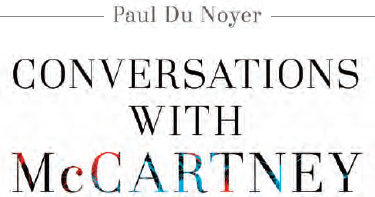
with 16 b&w and 12 color images
F or over 35 years, noted music writer Paul Du Noyer had unprecedented access to Paul McCartney. Conversations with McCartney is the result of Du Noyers long association with McCartney and his music. In the most comprehensive firsthand account of McCartney ever published, Du Noyer presents an honest, humorous, and unique perspective of the former Beatle: Until Paul McCartney writes his own memoir Paul Du Noyer has set the bar and you wont need any other volume on your shelf (London Weekly News).
As a budding music journalist, Du Noyer was invited by McCartneys office to interview the star in 1989. In the years that followed, Paul Du Noyer continued to meet with and interview Paul McCartney on a regular basis. He has spent more hours in formal, recorded conversation with McCartney than any other writer, discussing topics ranging from the music of the Beatles and Wings to McCartneys private feelings on John Lennon and his beloved wife Linda. Drawing from their interview sessions spanning several decades and coupling McCartneys candid thoughts with Du Noyers observations and analysis, Conversations with McCartney is beautifully writtenthe sensitive, shrewd depiction of one of the most accomplished artists of our time.
This edition first published in hardcover in the United States in 2016 by
The Overlook Press, Peter Mayer Publishers, Inc.
141 Wooster Street
New York, NY 10012
www.overlookpress.com
For bulk and special sales, please contact ,
or write us at the above address.
Copyright Paul Du Noyer 2015
Paul McCartney interview material supplied courtesy of MPL Communications Limited and MPL Communications Inc., all rights reserved.
All rights reserved. No part of this publication may be reproduced or transmitted in any form or by any means, electronic or mechanical, including photocopy, recording, or any information storage and retrieval system now known or to be invented, without permission in writing from the publisher, except by a reviewer who wishes to quote brief passages in connection with a review written for inclusion in a magazine, newspaper, or broadcast.
ISBN 978-1-4683-1341-3
For my parents

I dont actually want to be a living legend. I came in this to get out of having a job. And to pull birds. And I pulled quite a few birds, and got out of having a job, so you know, thats where I am still.
Paul McCartney
The nearest I have come to dying, so far, was an asthma attack in childhood. I found myself in a Liverpool hospital with an oxygen mask clamped to my face and radio headphones on my ears. The station was broadcasting the Beatles new record Abbey Road in its entirety. That is why, when people call the groups music life-affirming, I understand them in a very literal way. At that moment, I suddenly realised how much I loved them, and how much I wanted to live.
That was in 1969. Whereupon, of course, the bastards split up.
I forgave them, naturally, and followed all their solo careers with rapt attention. I grew up and became a music journalist, with the good luck to interview Paul McCartney on many occasions. John Lennon died before I ever had a chance to meet him, which is my biggest professional regret. But Paul and I seemed to hit it off.
That is how this book came about. I have drawn together our scattered conversations from each of those encounters, and reordered them into a single narrative. From it emerges, I hope, the story of McCartney the musician, told in his own words with a few of mine as well. His long career has produced a stupendous body of work that rewards listeners at every turn.
His position is unparalleled, whether we measure it in commercial success, artistic achievement, or his influence on others. In terms of posterity, his reputation will ultimately be unassailable. Id also contend that McCartneys music, sometimes dismissed by critics as safe and bland, is more often questing and downright strange.
Since he joined John Lennons band the Quarrymen in 1957, Paul has scarcely paused for breath. Hell write a timeless love song with the same ease that other people draw breath. Hell play rock and roll with more raw sex and aggression than you tend to encounter outside of penal institutions. The Queen of England thinks hes marvellous, but even the edgiest avant-garde types admit that his music can take a walk on the weird side. From kiddie-pop to classical, there is hardly a genre that he hasnt tried; probably only Picasso could rival Paul McCartneys claim to stylistic breadth.
Its actually very hard to have a hit record. To keep on having them is practically impossible. For all his peaks and troughs, McCartneys career rivals that of any contender we might nominate. The crumbs from his table would be the pride of lesser songwriters. The glory of show business is that it gives the people what they want. The glory of art is that it gives us what we never knew we wanted. And the glory of Paul McCartney is that he does both.
Have the results been consistently wonderful? Not at all. But when his star is in the ascendant there is no composer in the whole of popular music to match this mans ability to write the songs that make the whole world sing.

The Beatles attained a state of pop perfection very early on. After that, they did what seemed incredible, by revealing with each new record a new and completely different type of perfection. It couldnt last forever and it didnt. But Paul, like John Lennon, was expected to perform the impossible again and again, or else be held to the cruellest of accounts.
Paul, it was allowed, had a craftsmans facility that could glide from manic to manicured. But his soul, it was said, was still in show business. While his achievements as a Beatle made him a hip figurehead of the new rock culture they had helped to create, his heart could not abandon the occasional nursery rhyme or treat for the mums and dads.
A shameless crowd-pleaser, then? The stereotype has a nugget of truth, insofar as he never saw a reason to limit his musical palette. But it does him a grave disservice in suggesting that he was a lesser artist by virtue of his versatility. If you were feeling poetical you could say McCartneys work is like an oak tree: the trunk is strong and broad but its branches spread and twist in fantastical patterns.
He wisely shies away from this analogy, but Picassos transcendence of category, his sure grasp of traditional skills with an appetite for the new and untried, are things McCartney admires. And by now there is also the sheer enormity of his output, a tribute to both his energy and longevity. McCartneys music has not developed in any one direction over time. Instead it resembles a kind of unwinding spiral, achieving an ever-wider circumference.
Born on 18 June 1942, Paul McCartney emerged before the days of rock and roll; he was formed in a world that has utterly vanished now, and which was hastened on its way by the Beatles themselves. He came of age in the aftermath of the Second World War, one of the biggest disruptions in human history. All minds were now fixed on a modern world, and the less it resembled the past, the better. Nothing could be learned by looking backward. Or so it felt at the time.
Paul could be every inch the teenage rebel that his generation specialised in producing. But he was never, in his heart, an iconoclast. Thats a contradiction that has persisted throughout his music, and its the source of some critics contempt for what he did. But its really one key to his greatness. Hes among the last of that dwindling number who were not fundamentally shaped by rock, because they already had some musical understanding before it reached their ears.
Next pageFont size:
Interval:
Bookmark:
Similar books «Conversations with McCartney»
Look at similar books to Conversations with McCartney. We have selected literature similar in name and meaning in the hope of providing readers with more options to find new, interesting, not yet read works.
Discussion, reviews of the book Conversations with McCartney and just readers' own opinions. Leave your comments, write what you think about the work, its meaning or the main characters. Specify what exactly you liked and what you didn't like, and why you think so.

